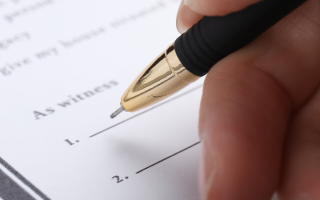
What the Court said
Think your Will is valid?
A recent court ruling shows how a simple signing mistake made an entire Will invalid
Every year South Africa dedicates a week to bring awareness to the importance of having a Will known as Wills Week. This year, Wills Week falls between 15 to 19 September 2025 and everyone is encouraged to use this time to reflect on their personal circumstances and to make sure that they have a valid Will and that it is up to date.
It is extremely important to ensure that your Will complies with the correct formalities and that when you sign it, you and the witnesses sign it in each other's presence. If this requirement, or any of the other requirements, are not complied with, it can leave your Will invalid and worthless.
In the recent case of Du Plessis v Reniers and Another (952/2024) (2025) ZAMPMBHC 39 (16 May 2025), the High Court had to decide whether a Will was invalid for not complying with the formal requirements.
In 2020, a married couple of 15 years, Mr. Reniers (“deceased”) and Mrs. Reniers (“Surviving Spouse”) both contracted COVID-19. The deceased was admitted to hospital while the surviving spouse self-medicated at home. Prior to the deceased's hospital admission, they decided to draft a joint Will together and requested their financial advisor to draft a Will for them. Upon drafting the Will, the financial advisor sent them the document and advised them about the requirements around signing the Will, which include that the Will must be signed in the presence of each other and of two witnesses.
During the deceased's hospital admission, the surviving spouse signed the joint Will at home and then gave it to their broker to take to the deceased at the hospital to sign. The broker took the Will and gave it to the deceased to sign the Will in his presence. The broker signed and dated the Will as one of the witnesses in the presence of the deceased.
However, after leaving the hospital, the broker gave the Will to his wife to sign as the second witness without being in the presence of either the deceased or the surviving spouse. Unfortunately, the deceased passed away four days after signing the Will.
The deceased's daughter from a previous marriage brought the matter to the High Court and applied for the Will to be declared invalid. Her application is based on many inaccuracies in the Will, such as the incorrect description of the deceased's marital regime, that some grandchildren listed in the Will were not the deceased's and that their names were not spelt correctly. She further argued that the Will must be invalid due to it not being signed in the presence of two witnesses.
The High Court confirmed the requirements for a valid Will as follows:
> It must be in writing.
> The Will must be signed at the end of it by the testator and two witnesses.
> The testator and the two witnesses must sign the Will in the presence of each other. It should be noted that a person who signs as a witness is disqualified from receiving any benefit from the Will.
> If the Will consists of more than one page, each page must be signed by the testator and by the witnesses anywhere on the page.
> If the testator is not able to sign the Will (for example, where s/he cannot read or write), someone can sign the Will on his/her behalf or the testator can sign the Will by making a mark (like a thumbprint or a cross). A commissioner of oaths must be present when the testator makes the mark or someone else signs on behalf of the testator.
> Any provision in the Will may not be against the public interest or good morals.
The High Court focused on the fact that neither of the two testators (deceased and surviving spouse), nor the witnesses signed in each other's presence and declared the Will to be invalid as it did not meet the legal requirements.
When signing a Will, it is easy for someone to think that a signature is fine no matter where and when it is done. However, this is not as simple when it comes to signing a Will. When signing your Will, make sure that you and the witnesses are in the same room and signing it in front of each other. Also, remember the limitations of who can sign a Will as a witness to avoid any risk of the Will being declared invalid. It is important to make sure that your Will meets all the legal requirements for it to be considered as valid and that if you have any doubts, get legal advice before signing the Will.
Did you know…Not signing your Will in the presence of the two witnesses can lead your Will to be declared invalid.